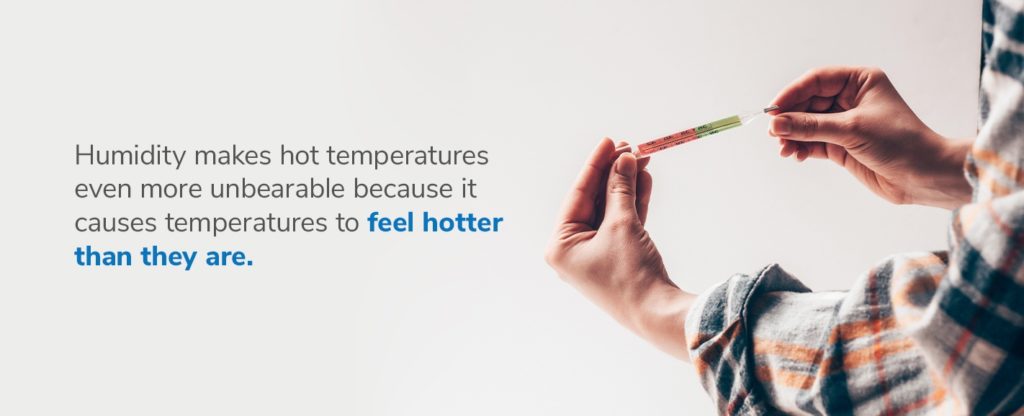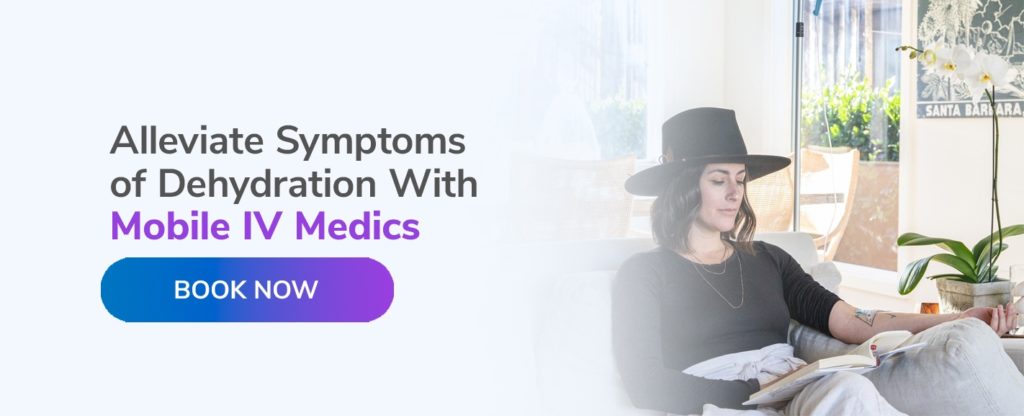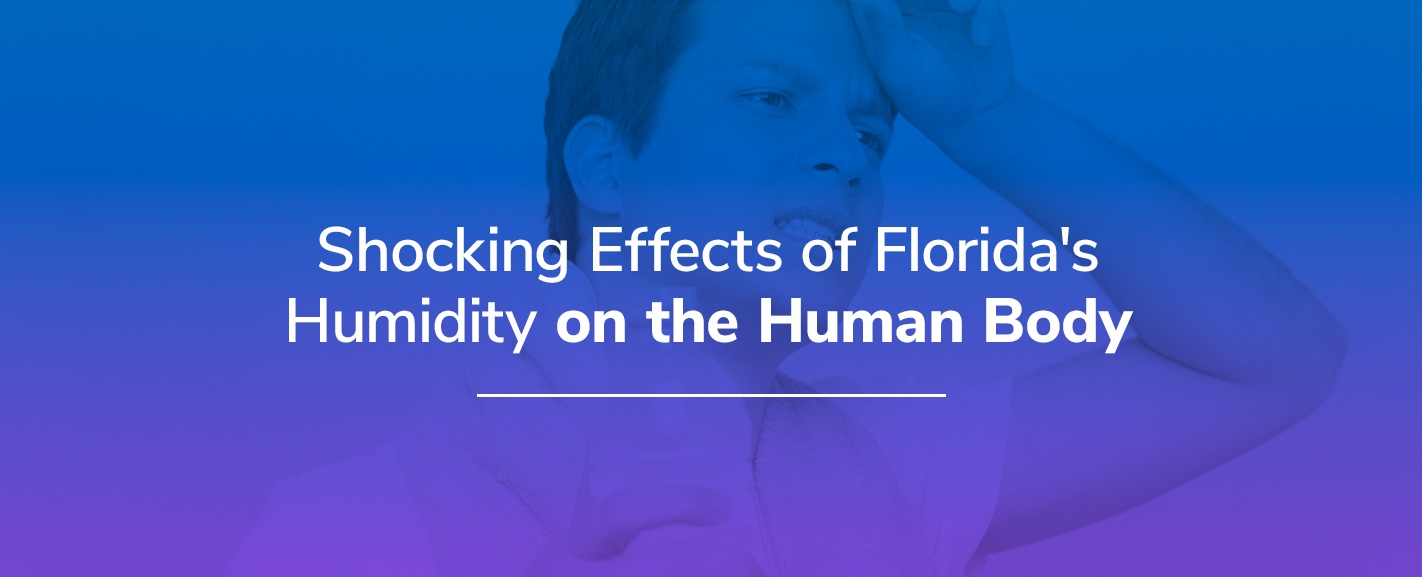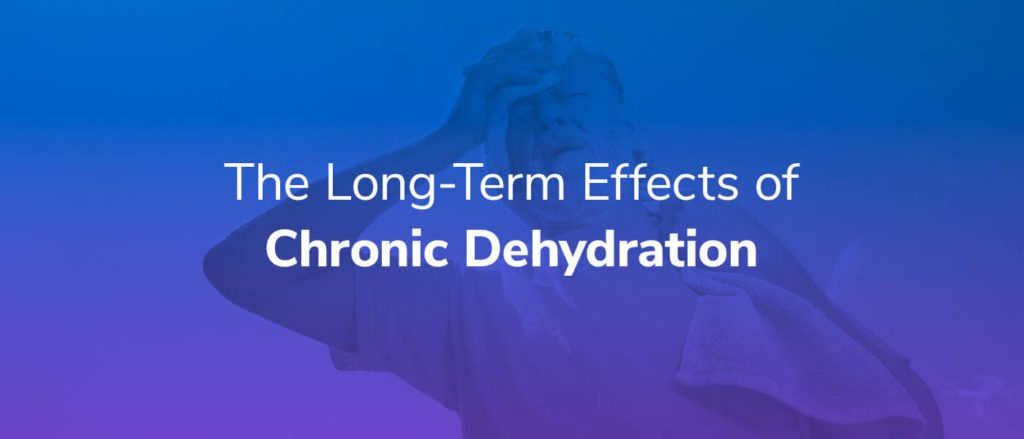It may not come as a surprise that Florida is the most humid state in the U.S. due to its proximity to the Gulf of Mexico, the Atlantic Ocean and the everglades. Many people flock to Florida from other states to avoid the cold and realize the high humidity can have its own adverse effects on the body.
You’ve likely experienced the impact of humidity on the human body, whether you’re a native Floridian or a newcomer to the area. High humidity levels can lead to dehydration, allergy-like symptoms, low sleep quality, worsened asthma and inflamed skin conditions, among other health concerns.
- Effects of High Humidity on Skin
- Humidity and Exhaustion
- Humidity Illness Symptoms
- Dehydration and Humidity
- Alleviate Symptoms of Dehydration With Mobile IV Medics
Effects of High Humidity on Skin
High humidity can have various impacts on your skin. The skin has an adverse reaction when it’s consistently exposed to humid air because the water content prevents your skin from taking care of itself as it usually would.
Humidity also leads to bacterial infections on your skin that can impact your sweat glands or cause acne, rashes, eczema and dermatitis. If your skin is acne-prone or you suffer from eczema, humid conditions will likely worsen these ailments.
Humidity causes people to sweat more than they usually would if they were in dry, low-humid heat. Excessive sweating can cause a build-up in your skin, leading to clogged pores and rashes, which can further exasperate skin conditions you already have.
Alternatively, humid conditions and high heat can also cause a disease called anhidrosis. Anhidrosis is when your sweat ducts close off, which results in sweat becoming trapped underneath your skin. Symptoms of anhidrosis include bumps and blisters. Sweating is useful when it’s sweltering hot because it cools your body down. You can suffer from heat rashes or strokes if you’re unable to cool yourself off through sweating. See a doctor right away if you notice your body isn’t producing sweat.
Fungal infections thrive in climates with high humidity because the fungi grow and spread faster in their ideal environment. If you live in an area with high humidity, you’re more susceptible to common fungal infections such as athlete’s foot. It’s a good idea to change your socks often and see a doctor if you think you have an infection on your skin.
Humidity and Exhaustion
You likely have the first-hand experience feeling exhausted from the humidity if you’ve lived in Florida for long. You can wake up feeling energized, and then after just a short time outside, you may start to feel sluggish or lethargic even if you weren’t doing any strenuous activities.
Your body has to work extra hard to keep yourself cool when you spend time in humid conditions. Our bodies rely on maintaining a consistent temperature for all of our bodily functions to work as intended. Maintaining that temperature in extreme conditions, such as Florida’s humidity, can take a toll on the body.
When you spend time in high heat and humidity, your body changes to adapt to the climate. The two primary bodily adaptations are the dilation of blood vessels and sweat production. The dilation of blood vessels allows your blood to flow closer to your skin to cool off. Sweating is a natural response to heat because the liquid on your skin should cool you off.
Your body goes through extra work to perform these bodily processes to cool you off — your heart rate and metabolic rate increase, which burns extra calories and makes you lose energy faster. The metabolic rate is the calories your body needs to perform life-sustaining functions.
Sweating can cause dehydration if you’re not drinking enough fluids, and dehydration can also cause exhaustion. Likewise, sunburn can also cause your body to divert fluids to the burned area to start the healing process, which takes more water away from your body. You should ensure you’re drinking plenty of water and eating fresh fruits and vegetables to prevent dehydration and stay energized in humid conditions.

Humidity Illness Symptoms
Humidity makes hot temperatures even more unbearable because it causes temperatures to feel hotter than they are. High heat combined with high temperatures is a dangerous combination. For instance, 100% relative humidity (RH) can make 75 degrees Fahrenheit feel like 80 degrees. Exerting energy in temperatures above 91 degrees Fahrenheit is likely to lead to heat exhaustion and possibly heatstroke at higher temperatures. Our bodies aren’t designed to be in such high temperatures, and it can be perilous to stay out in the heat for prolonged periods.
High humidity and heat lead to a variety of symptoms that some refer to as humidity or heat illness. Sweating is our body’s primary defense against heat, but it’s only useful if the sweat can evaporate and cause its cooling sensation. It’s harder for the air to absorb perspiration when it’s humid because there’s already a high moisture content. The sweat is left with nowhere to go and remains on your body. We then become hotter and continue to sweat without relief.
The high humidity causes our body temperature to rise, and our bodies respond by working harder to cool us off. The bodily processes are intensive and can wear us down over time. Our bodies lose water, sodium and other essential nutrients through sweat when we become too hot, leading to heat exhaustion and heatstroke, which are both dangerous and potentially deadly.
Overheating can also lead to the following medical conditions:
- Heat exhaustion
- Heatstroke
- Muscle cramps
- Heat swelling
- Fainting
You should go indoors to an air-conditioned space if you begin to feel tired while spending time outside in the high humidity. Give your body a chance to recuperate before going back out in the heat.
Dehydration and Humidity
High humidity causes dehydration due to increased sweating, and it can become a life-threatening issue if left untreated. You can quickly become dehydrated when you are overexposed to the sun in humid conditions after losing more water through sweat than you’re taking into your body. When you sweat, you lose water and your body’s reserves of sodium, potassium and other essential nutrients. The loss of chemicals leads to an imbalance within your body, and you can lose the materials necessary for your bodily functions.
While people experience dehydration differently, there are many symptoms you may encounter when dehydrated. These include:
- Rapid heart rate and breathing
- Extreme thirst
- Dizziness
- Confusion
- Dry mouth
- Fatigue
- Muscle cramps
- Light-headedness
For mild dehydration cases, it’s vital to relax in a cool area and drink plenty of fluids like water or a sports drink to replenish electrolytes and hydrate. Eating fresh fruit and vegetables with high water content such as watermelon, cucumbers, oranges and apples can also help rehydrate your body and replace lost nutrients. Moderate and severe dehydration will typically require rehydration through IV fluids administered at a hospital or your own home.
Here are things you can do to ensure you don’t become dehydrated:
- Take in more fluids than you lose through sweating.
- Partake in physical activities in the cooler parts of the day like early mornings and evenings.
- Drink sports drinks to maintain a healthy balance of electrolytes.
If you are too dehydrated to sweat appropriately, your body cannot cool itself down, and you can experience heatstroke. Heatstroke occurs when your body reaches dangerous temperatures due to prolonged sun exposure.
The symptoms of heatstroke vary but include:
- Headache
- Dizziness
- Disorientation or confusion
- Seizure
- Extreme fatigue
- Loss of consciousness
- Hallucinations

Alleviate Symptoms of Dehydration With Mobile IV Medics
It’s easy to become dehydrated when you spend time in Florida’s humid heat. When you experience dehydration symptoms, schedule an appointment with Mobile IV Medics, and we’ll bring an IV package personally designed to suit your needs and alleviate the symptoms you’re facing.
Our registered nurses administer an IV right in the comfort of your home to restore hydration to your body and help you recover. Our medical director and pharmacist designed our IV hydration package to get you back to feeling revitalized and refreshed after a long day in the sun. You can also customize the package to tailor it to your unique symptoms. Are you looking for a burst of energy? Add in a boost of vitamin B12. Are you feeling nauseous? We can offer relief for that, too!
Book our services online, and we can be at your door within an hour. View our IV treatment menu to find the right IV package for you.
Sources
- https://climatecenter.fsu.edu/topics/humidity
- https://www.verywellhealth.com/bacterial-skin-infections-1069439
- https://pubmed.ncbi.nlm.nih.gov/30238598/
- https://www.mayoclinic.org/diseases-conditions/heat-rash/symptoms-causes/syc-20373276
- https://www.mayoclinic.org/diseases-conditions/sweating-and-body-odor/symptoms-causes/syc-20353895
- https://www.webmd.com/skin-problems-and-treatments/guide/fungal-infections-skin
- https://ksi.uconn.edu/prevention/heat-acclimatization/#
- https://www.healthline.com/health/what-is-basal-metabolic-rate
- https://www.healthline.com/health/dehydration#signs
- https://science.howstuffworks.com/environmental/earth/geophysics/h2o.htm
- https://ksi.uconn.edu/emergency-conditions/heat-illnesses/heat-exhaustion/#
- https://medlineplus.gov/heatillness.html
- https://www.ncbi.nlm.nih.gov/pmc/articles/PMC2267797/
- https://www.health.harvard.edu/a_to_z/heat-stroke-hyperthermia-a-to-z
- https://www.mayoclinic.org/diseases-conditions/dehydration/symptoms-causes/syc-20354086
- https://www.hopkinsmedicine.org/health/conditions-and-diseases/dehydration-and-heat-stroke
- https://www.cdc.gov/disasters/extremeheat/warning.html





